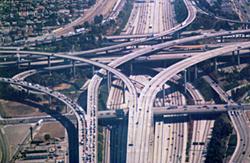We rarely hear a good word for urban sprawl. Apparently it is “unsustainable” because it robs land from farming and nature conservation and has a big carbon “footprint”.
However if all 9 billion of us mid century were living at the density of a leafy suburb, say 3000 per square kilometre, that would require 3 million square kilometres. This would constitute an area considerably less than half that of the contiguous US – or a bit more than the eastern states of Australia. I must say I don’t find that especially scary.
We certainly would not want to encroach too much on farm land, at least not unless we had made the big shift to vertical farming where food is produced using hydroponics in high rise buildings. Nature conservation would also make us want to rule out habitation in some areas. In others, it may be that we would decide to keep down density by having various special arrangements in place. This would include retaining a lot of the original vegetation and controlling threats from exotic flora and fauna. Keeping the cat in at night would be essential.
And, there are lots of deserts to sprawl into. This is popular in places like Las Vegas, Phoenix and The Arab Gulf. You can’t grow anything there and nature would not mind too much.
A detached house with some land is more important for some people than others. Young families want it and so do older people with a garden. (And if your daughter has a horse you will need a nearby paddock…) Other people would be happy to sprawl upwards. This often happens where a location has a special attraction such as a view, lots of night life or requires less travelling. I am not talking “public housing” here. I have in mind a balcony, three bedrooms, study, large kitchen, lounge and dining room. I also envisage all the extras eg parking, gym and pool on the premises.
Floating cities are another possibility. These would allow us to sprawl out into the world’s oceans and experience constantly changing locations.
There is some dispute over whether living in the suburbs is more energy intensive, and hence more carbon intensive, than living in higher density inner areas. Either way I don’t think I can get too worried about carbon footprints. I’m not a climate alarmist, and besides we will undoubtedly move away from carbon based energy sometime later this century.
My hunch is that the urge to sprawl will increase as advances in transport technologies make travel cheaper and less painful. Personal Rapid Transit is one option. Driverless cars is another. These would involve far less death and injury, give us greater ability to avoid congestion and leave us free to read, teleconference, watch a movie, sleep or whatever.
Mass transit is definitely not the answer to current problems. Our transport needs are dispersed in both time and space, and so we need a system that moves individuals not masses.
Returning to the present, some cities have legal walls around them to prevent sprawl (“smart growth” it’s called). Often this is combined with a total failure to allow sufficient housing development within existing areas. House prices then go through the roof. The ratio of average house prices to average income is two to four times higher in “smart growth” cities than in places such as Germany, and the more freewheeling parts of the USA.
Melbourne (Australia), where I live, is surrounded by “green wedges” where building is not permitted. Given that there are no breaks between adjoining wedges, it is more like a noose strangling the city. A city under siege you might say.
In the long term however there will be no end to our sprawl as we spread out into the rest of the solar system and beyond.
———
Some extra links:
Demographia a pro-sprawl web site.
The Institute of Public Affairs’ page on Australian housing
Here is a Green link on Personal Rapid Transport






Recent Comments